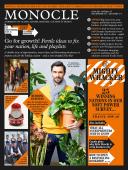
Issue 99
Go for growth! Fertile ideas to fix your nation, life and playlists. A double issue of opportunities, smart ideas and blossoming businesses to prepare you for the holiday season – and a very fruitful New Year.
In This Issue
Oops! No content was found.
Looks like we no longer have content for the page you're on. Perhaps try a search?
Return Home

